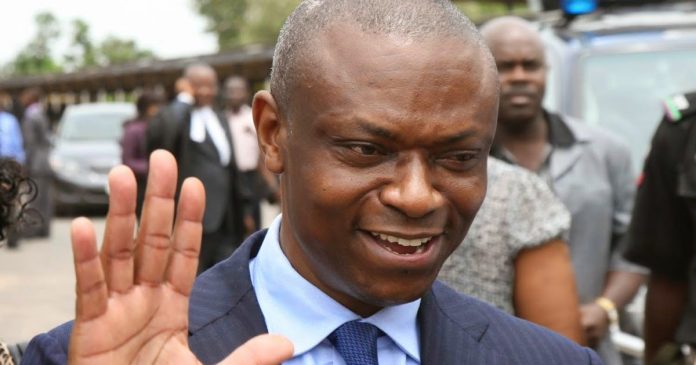...To get all news updates, Join our WhatsApp Group (Click Here)
Also Join our WhatsApp Channel (Click Here)
Before ex-bank chief, Francis Atuche’s incarceration, the Hubmart chain of stores was the go-to supermarket for the upper-middle-class due to the top-notch service it provided and the quality of goods for sale. The success of the flagship store on Adeola Odeku prompted Atuche and his wife, Elizabeth, to replicate the store in other parts of the Lagos metropolis, such as Lekki Phase 1, Ojodu, and Ikeja GRA. From making shopping a pleasurable experience to its tasty meals and fast food, which competed favorably with some of the best food outlets in Lagos, Hubmart was the brand to beat. But all that is now in the past as it has since lost the spark that got people trooping to its various branches to shop. Shoppers now leave disappointed unable to purchase items as shelves are now empty, food sold there is reportedly stale and there is palpable low morale among the workers.
Hubmart’s flagship store on Adeola Odeku Road is the worst hit as passersby have been heard telling anyone who plans to drive in to shop, to avoid the place like a plague. No doubt, this development has largely being caused by lack of attention from the promoters, who seemed to have focused more on emerging victorious in a long-drawn fraud case instituted against them by the Economic and Financial Crimes Commission. Unfortunately, they lost the case and Francis Atuche is currently serving a six-year jail sentence for appropriating the sum of N56 billion.
Considered a wizard when it comes to banking, Francis would later rise to the peak of his career as the managing director of Bank PHB now Keystone Bank. With position came influence and then money which he had full access to. Not only was he well respected in the banking industry, Atuche and his wife also courted the limelight. They were the quintessential couple who never failed to light up any social event they stepped into together.
While Francis was always dressed in some of the best designer silk suits, his wife was no less different. From high street apparels to jewelries made from different precious stones, Elizabeth was always drenched in them. Gracing newspaper and magazine covers was like breathing to them. But what many didn’t know was that the couple was involved in money laundering, using depositors’ funds.
In 2011, they were arrested gestapo style by the EFCC in their palatial Ikoyi home for laundering N8.6 billion. Atuche was also accused of using his wife’s company, Ghazali Yakubu Investment Ltd, to steal depositors’ funds totaling over N100 million. He was arraigned on two separate charges before Justice Adeniyi Onigbanjo of the Ikeja Division of the Lagos State High Court for allegedly conspiring with Funmi Ademosu, a director in the bank, to steal N4.2 billion, which was part of the proceeds from the sale of 241,579,284 units of Afribank shares and joint property of Caverton Helicopters Ltd and Bank PHB.
In the second charge, Atuche allegedly conspired with another bank director, Lekan Kasali, to steal N7.2 billion, which they fraudulently described as loans to Cogipar Nigeria Limited. His wife, Elizabeth was arraigned before another judge, Lateefah Okunnu, on a three-count charge of conspiracy and stealing N11.4 billion being property of Bank PHB Plc by fraudulently converting the proceeds of several illegal loans for the acquisition of 337,500, 000 units of Bank PHB Plc shares on behalf of Ghazali Yakubu Investment Ltd. and AFCO Associates Limited.
The following month after they were arrested, the EFCC amended the charges against the Atuches and re-arraigned them before Justice Okunnu on a 27-count charge bothering on conspiracy to commit felony and stealing of N25.7 billion belonging to the bank. The amended charges alleged that Atuche, his wife, and Ugo Anyanwu, a former chief financial officer of Bank PHB, used some of the stolen funds to purchase 140,625,000 units of Bank PHB shares on behalf of Guesstrade Services and Clearville Business Support. They also allegedly used part of the money to purchase 112,500,000 units of Bank PHB share.
The trial which began in July 2011 lasted 10 years. Witness after witness testified to Francis Atuche’s corrupt practices, from crediting a customer’s account unknowingly with a N10.9 billion loan to granting N14.3 billion loans to some companies without the approval of the bank’s board and releasing the sums of N35 million and N10 million as tithes to St. Monica Catholic Church and St. Augustine Catholic Church, both in Delta State.
From initially discharging and acquitting Atuche, who fought to halt the trial in his favour, to dismissing the case due to lack of jurisdiction, to eventual reopening of the case after a Supreme Court ruling, the case was finally concluded in June 2021. Shortly before he was sentenced to six years imprisonment by Justice Okunnu, Francis who had formerly boasted that as a Catholic who was baptised in the church and one who takes the Holy Communion every day, he could not possibly be a thief because God has been gracious to him, suddenly began to plead for leniency.
“As a professional banker and chartered accountant, I don’t want to become a convict. I pray that God will place in your heart to be kind. I plead from the bottom of my heart. I’m extremely sorry, today will be a turning point in my life, I’m very sorry,” he told Okunnu.
You can get every of our news as soon as they drop on WhatsApp ...To get all news updates, Join our WhatsApp Group (Click Here)
Also Join our WhatsApp Channel (Click Here)

















